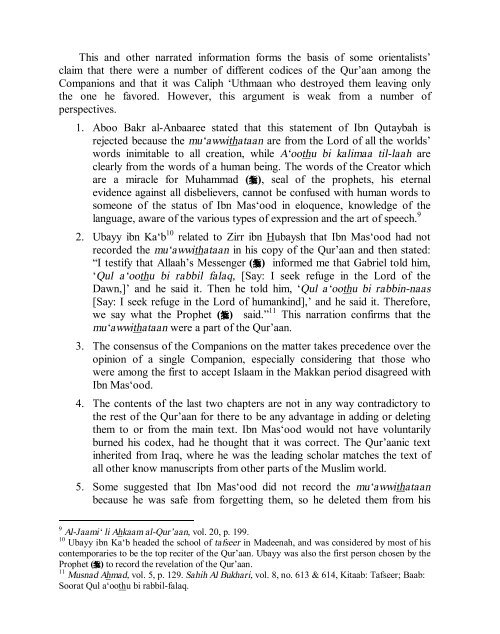You also want an ePaper? Increase the reach of your titles
YUMPU automatically turns print PDFs into web optimized ePapers that Google loves.
This and other narrated information forms the basis of some orientalists’<br />
claim that there were a number of different codices of the Qur’aan among the<br />
Companions and that it was Caliph ‘Uthmaan who destroyed them leaving only<br />
the one he favored. However, this argument is weak from a number of<br />
perspectives.<br />
1. Aboo Bakr al-Anbaaree stated that this statement of Ibn Qutaybah is<br />
rejected because the mu‘awwithataan are from the Lord of all the worlds’<br />
words inimitable to all creation, while A‘oothu bi kalimaa til-laah are<br />
clearly from the words of a human being. The words of the Creator which<br />
are a miracle for Muhammad (r), seal of the prophets, his eternal<br />
evidence against all disbelievers, cannot be confused with human words to<br />
someone of the status of Ibn Mas‘ood in eloquence, knowledge of the<br />
language, aware of the various types of expression and the art of speech. 9<br />
2. Ubayy ibn Ka‘b 10 related to Zirr ibn Hubaysh that Ibn Mas‘ood had not<br />
recorded the mu‘awwithataan in his copy of the Qur’aan and then stated:<br />
“I testify that Allaah’s Messenger (r) informed me that Gabriel told him,<br />
‘Qul a‘oothu bi rabbil falaq, [Say: I seek refuge in the Lord of the<br />
Dawn,]’ and he said it. Then he told him, ‘Qul a‘oothu bi rabbin-naas<br />
[Say: I seek refuge in the Lord of humankind],’ and he said it. Therefore,<br />
we say what the Prophet (r) said.” 11 This narration confirms that the<br />
mu‘awwithataan were a part of the Qur’aan.<br />
3. The consensus of the Companions on the matter takes precedence over the<br />
opinion of a single Companion, especially considering that those who<br />
were among the first to accept Islaam in the Makkan period disagreed with<br />
Ibn Mas‘ood.<br />
4. The contents of the last two chapters are not in any way contradictory to<br />
the rest of the Qur’aan for there to be any advantage in adding or deleting<br />
them to or from the main text. Ibn Mas‘ood would not have voluntarily<br />
burned his codex, had he thought that it was correct. The Qur’aanic text<br />
inherited from Iraq, where he was the leading scholar matches the text of<br />
all other know manuscripts from other parts of the Muslim world.<br />
5. Some suggested that Ibn Mas‘ood did not record the mu‘awwithataan<br />
because he was safe from forgetting them, so he deleted them from his<br />
9 Al-Jaami‘ li Ahkaam al-Qur’aan, vol. 20, p. 199.<br />
10 Ubayy ibn Ka‘b headed the school of tafseer in Madeenah, and was considered <strong>by</strong> most of his<br />
contemporaries to be the top reciter of the Qur’aan. Ubayy was also the first person chosen <strong>by</strong> the<br />
Prophet (r) to record the revelation of the Qur’aan.<br />
11 Musnad Ahmad, vol. 5, p. 129. Sahih Al Bukhari, vol. 8, no. 613 & 614, Kitaab: <strong>Tafseer</strong>; Baab:<br />
Soorat Qul a‘oothu bi rabbil-falaq.














